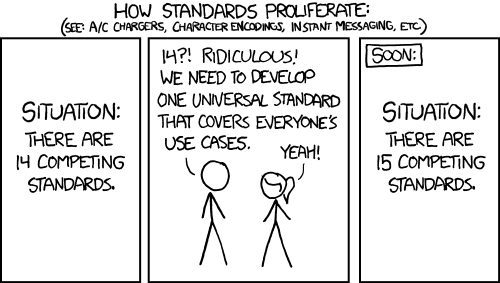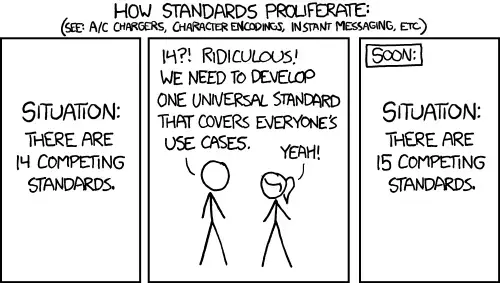Why are there so many programming languages? And why are there still being so many made? I would think you would try to perfect what you have instead of making new ones all the time. I understand you need new languages sometimes like quantumcomputing or some newer tech like that. But for pc you would think there would be some kind of universal language. I’m learning java btw. I like programming languages. But was just wondering.
you would think there would be some kind of universal language

You got to it before I did. Programming languages are like vehicles. You wouldn’t take a sports car off-roading, and you wouldn’t expect a tractor to win a drag race. There is a lot you can do with an all-purpose vehicle, but it’s not going to be as good as something that is purpose-built for a single task.
I actually don’t think that’s the case for languages. Most languages start out from a desire to do some specific thing better than other languages rather than do everything.
If there was a single language, afterwards the same broken logic would be applied to frameworks and libraries, and we all know how many people bitch and whine over Java and it’s extensive standard library.
JavaScript (is the universal language) (is also the answer of why there are so many languages)
You can’t easily improve a language and stay compatible with the previous versions. C++ does it but they are crazy.
you would think there would be some kind of universal language
It does not exist, but anyone is free to try and invent it. It should be low-level like assembly and high-level like BASIC, functional, object-oriented, and have weird stuff like traits, concepts, and alien features from Haskell. It must also have both the pointers/references of C++, and the borrow checker of Rust. And don’t forget to make it as secure as Ada with pre and post conditions. But it must still be easy to use. Also you will have to write a compiler for every operating system ever (mainframe, server, desktop, iOS, Android, every phone, every tablet), and contain a universal GUI that pleases everyone. It’s literally impossible to do right now.
Last but not least, Java was supposed to be this universal language that you can run everywhere. It failed and it cannot be run everywhere. It also had to be improved a lot, and it’s missing a fuckton of features from every other language.
easily improve … C++
I assure you that there is absolutely nothing easy about the C++ standardization process, lol.
Such an abomination could be created. Just imagine all the over engineering that would be required.
It would run ANYTHING on ANY platform by incorporating every libc and assembler and VM and dynamic interpreter.
It runs on EVERY platform and thus it can be adequately tested on NO platform.
Also, by the time you’ve gotten it to compile, another two versions have come out.
I’d call it Paradox Lang, or PL for short. It even has features that are contradictory to each other, you just have to declare which mode you want at the top of every file. Can you imagine. :)
The only feature it doesn’t have is “lightweight and minimal language”.
It should be low-level like assembly and high-level like BASIC, functional, object-oriented, and have weird stuff like traits, concepts, and alien features from Haskell. It must also have both the pointers/references of C++, and the borrow checker of Rust.
Hang on a minute. Isn’t that literally just
RustCrabLang?Rust still lacks OOP (the inheritance/subtyping part of it) though. And some more advanced Haskell features too, like HKT.
I’ll take your word for it about the missing Haskell features, but with regards to inheritance, they deliberate chose to avoid it. They use an alternative model to achieve the same goals inheritance is meant for, but without the issues that come along with it. Their approach is basically a more advanced version of how Go uses interfaces to define shared behaviour.
Ooh rust just became more appealing to me.
It is pretty neat. They’ve made a lot of really interesting design decisions that make for a pretty unique language.
One of its main selling points is how it guarantees memory safety without using a garbage collector. That, plus the fact that it does a shit-ton of compile-time optimizations, actually makes it pretty fast. Like, 80%-90% as fast as C (which is much faster than all the other high-level languages like Java, Go, etc, partly because they do in fact use garbage collectors).
If you want to check it out, I recommend this playlist as a solid intro.
Here is an alternative Piped link(s): https://piped.video/playlist?list=PLai5B987bZ9CoVR-QEIN9foz4QCJ0H2Y8
Piped is a privacy-respecting open-source alternative frontend to YouTube.
I’m open-source, check me out at GitHub.
Oh yeah, I get all of those, because I am a Rust programmer myself who hates OOP. :D
I raised the topic up only because of how people were talking about “the ultimate language with everything”.

Thanks for the laugh 😭
Sometimes it’s easier to try a new idea in a new language (e.g. the borrow checker in Rust) rather than trying to shoehorn it into an existing language.
Rust’s borrow checker is a bad example. There are already a few projects that target C++ and support both runtime and compile-time checks, not to mention static code analysis tools that can be added to any project.
Uh, they’re different, though. There is no C++ tool (AFAIK) providing an exhaustive check of ALL the data lifetimes. I even think it’s impossible, because their semantics are really different. Rust is move by default, C++ copy by default; Rust has no inheritance with its constructors, etc.
There is no C++ tool (AFAIK) providing an exhaustive check of ALL the data lifetimes.
Your reply reads like an attempt at moving the goal post.
The initial point was “Sometimes it’s easier to try a new idea in a new language (e.g. the borrow checker in Rust) rather than trying to shoehorn it into an existing language”, to which I pointed the fact that yes it’s indeed possible to “try a new idea” like borrow checking, and it only takes adding a tool that runs in a post-build/unit test step. It’s simpler, easier, and does not force anyone to rewrite projects from scratch.
Claiming “oh but it might not work as well” is not an answer or a refuttal.
Some people consider working on programming languages fun, so they create new ones.
Partly because sometimes a particular language suits a particular problem set.
Partly because people just like writing computer languages.
But mostly because people mistake the fundamental problem of programming, which is programming is really hard. So someone comes along and thinks “Programming is really hard, it must be a problem with the languages available” and sets out to write a computer language that makes programming easy.
But all that happens is they trade one set of difficulties for another set of difficulties. They might succeed in making writing the initial version easier, but make maintaining that code harder. Or they might solve some memory allocation problems, but create performance issues.
Either way, someone will write a language because they think they will help solve the issue of programming being hard, and fail. Because the really hard bit about programming is about understanding everything the program needs to do, in microscopic detail, and translating that into a structure that best fits the problem; not the actual coding itself.
This is why we need low code solutions /s
Think of a programming language as a crutch for the human brain. Processors don’t need it: they don’t have to think about the code, they just execute it. Our mushy human brains need a lot of help, however.
We need to think about things on our own terms. Different programming languages, different APIs that do the same thing, different object models, these all help people tackle new problems, or even just implement solutions in new ways.
Some new languages have a completely different model of execution you may not be familiar with. Imperative languages are what we traditionally think of, because they work most similarly to how processors execute code: the major pattern used to make progress, do work, is to create variables and assign values to them. C, COBOL, BASIC, Pascal, C# (my personal favorite), Javascript, even Rust, are all imperative languages.
But there are also functional languages, like ML or F#. (The latter, I keep installing with Visual Studio but never ever use) The main pattern there is function application. Functions themselves are first order data, and not in a hacky implementation-specific way like you’re passing machine code around. (I’ve only ever used this for grad school homework, never professionally, sadly.)
And declarative languages like Prolog helped give IBM’s Watson its legendary open question answering ability on national TV. When you need a system to be really, actually smart, not just create smart-sounding text convincingly like a generative AI, why not use a language that lets you declare fact tables? (Again, only grad school homework use for me here)
Programming is all about solving problems, and there are so many kinds of problems and so many ways to think about them. I know my own personal pile of gray mush needs all the help it can get.
Think about this: Why are there so many automobiles? And why are so many new models still being made? I would think you would try to perfect what you have instead of making new ones all the time. I understand you need new automobiles sometimes, like construction equipment trucks or some treaded military tanks. But for average daily driver you would think there would be some kind of universal automobile. I drive a Corolla btw. I like automobiles. But was just wondering.
I’m not here to mock you, just providing an analogy. You can deliver just about anything in one language that you can with another. However, like the car, you might need a different type if you want more performance. Maybe you want a fast car. High performance cars often need a lot of attention, they need that premium gas, the mechanics demand higher pay! What if you only care about getting from point A to point B, and you’re more concerned with driving a car that’s cheaper to maintain, maybe there are just more car mechanics for that type of car, and the cost to pay them is cheaper.
A C application that is very well tuned to manage memory and threads in the name of perfect performance will require more time and computer science knowledge to create when compared to a Python script that does the same thing, but in the most basic possible way running on a single CPU, running hundreds of time slower.
Sometimes you need the performance, and often you don’t. Sometimes you need a treaded tank, sometimes you need a NASCAR, and most days the Corolla does just fine, it’ll even let you miss a few oil changes before things get bad.
As to why we don’t perfect what we have now instead of creating more: technology changes, easier to work with abstractions come about, some people enjoy the hobby of creating a language, or maybe a niche language comes about with very specific trade offs for a very specific purpose, no one wants to break backwards compatibility by adding new features and syntax to their language - I’m sure there’s tons more reasons to list.
Long has man wanted to experiment with as many partners as he can.
well … we all know the perfect programming language was created way back in 1960
Ugh, for my work we maintain a software add-in written in Lisp and it’s a nightmare to work on
And that link somehow doesn’t open well for me, something about a bracket I believe
And that link somehow doesn’t open well for me (something about a bracket I believe
https://en.wikipedia.org/wiki/Lisp_(programming_language)
(What do (you) mean? ( Lisp certainly has its (downsides) and (upsides)))
(do (What) (you mean))
(has Lisp (and (its downsides) (its upsides)))[Lisp would be a VSO language]
You’re wrong. COBOL is obviously the most perfect language since it can be easily written by managers and people who don’t know how to program, right?
I would think you would try to perfect what you have instead of making new ones all the time.
Perfecting what you have often leads to a completely different language. See C vs C with classes which ended up being C++.
There is absolutely no problem with creating new languages. These are often designed with specific features in mind, and the success cases often offer features that are in high demand. Take for instance node.js, and how its event loop makes it a near ideal language for network-heavy applications that run on a single thread.
Well I guess I am part of “they” since I have my own programming language pet project. Why did I create it? Because I wanted to, mostly. Sure, there are also some finer language design choices I wanted to choose differently for my preference, but mainly I just wanted to learn how.
Why do we need Java AND JavaScript? \s
deleted by creator
I know a handful of languages and I think of them as tools. For example, a flathead screwdriver will work on a phillips screw head (In most cases with some outliers), but a phillips screwdriver might just be better for the job. Same with a wrench and a socket with a ratchet, etc.
When it comes to programming or scripting I approach it in the same way. If I am at work, and I need to automate something quick and dirty, no end user will need to use it, and it is just adjusting data or spitting data back at me, I am probably going to write it in Python.
Or, if I need to make something that an end user is going to interact with, I am probably going to spin up a web server and use the MERN stack to create that.
If I am working at home on a TUI for my favorite application, I am going to use Rust or Python
And if I working on a project that requires me to work with embedded systems, I am probably going to reach for C, maybe C++ depending on the support, and I have in a couple of instances needed to use Assembly.
All this to say, I think that if I had to use Python for all of these, I would be in trouble. Same as if I had to use C++ to accomplish all of the above. Could it be done? Sure. Do I want to do that? Not at all.
For various reasons.
Different languages take different approaches and models to do stuff. Thus making each one better or worse for different challenges.
For example, python is easy and quick to get up and running. Bug it’s slow and unsuited for low level programming (like OSes, drivers, and embedded stuff). On the other hand, C is very fast and very low level, allowing you to make both high performance programs and low level stuff, but it’s a nightmare to use and you will run into all sorts of problems that an easier language, like python would avoid. All of this is mostly due to python being interpreted (instead of compiled) and c having manual memory management.
But they might also take a different approach at computation, like for functional languages (opposed to imperative languages) which try to solve problems in a more “mathematical” and declarative way, instead of defining a sequence of instructions. Or, even more, logic programming languages, in which you define a series of logical statements and the language tries to find solution and draw conclusions from them.
And some languages are designed around some particular concept that they think is beneficial and worth exploring, maybe taken from various other languages and put together, like rust which is designed around the RAII design pattern and takes large inspiration from functional languages, while still being and imperative procedural language (like C, so not object oriented). Or java which was designed to be a portanle but performante object oriented language, with support for low powered embedded system, full of features but simpler than c++, etc… all stuff that now is nothing special, but remember that java us very old. Or kotlin which tries to be java (they are interoperable), but modern and better and more “pure” or “consistent”. Or c++ that started as an object oriented superset of c, but then started adding every single feature of every other imperative language, and never giving up on older stuff, to the point of becoming very hard to use correctly while making it very easy to screw yourself in the most intricate ways.
And of course there are domain specific languages (opposed to general purpose languages). Which aren’t even necessarily Turing complete. They are designed for one purpose only, and they do that better than general purpose languages. For example AWK for text processing, or SQL for databases, or matlab for scientific calculations, or TeX for typesetting, or GLSL for shaders, or coq for theorem proving. And here imagination truly is the limit.
So, the point is, every language is more suited then other for some kind of work. And when people stumble across some problem that is hard to tackle and come up with some approach to solve it, or when they grow fed up with the issues of some older languages, they often like to make a new language around that. And some times this leads to entirely new paradigms which are worth exploring.
P.s.: I like languages:)
How do you know which language to use? And how do you know if you should stick to a language that you already know or if you should learn a new one?
Sorry if this is a dumb question I only just finished my first year of being a comp sci major
It’s not a dumb question. The answer is “it depends”, it’s mostly a choice. The general rule is that when yo start a project, you choose the language that you think will help you the most, whether that is because you already know the language, or because you have to work with stuff that already use that language, or because the language is better at doing that.
Regarding whether to stick to a language or learn a new one, in general your CS teachers will tell you (and they are correct) that you should not “learn to program in a language” but just “learn to program” and then apply that knowledge to whatever language you need. So, you should always learn languages that are different from the ones you already know in order to learn new paradigms, and then when you need a specific language, just learn the details about it. BUT, even if this way you will be able to use most languages, you will not be “good” at most, so you should also have some languages that you know really well and are experienced in. And for that you should choose the ones that are more useful to you (or maybe useful for your job) or the ones that you like.
Generally the most supported language on the tool/platform you want to target is the best one. Like SQL on databases, JS/ES in browsers, python in data science related stuff, etc. If multiple are heavily supported then just pick the one that’s the most comfortable.













